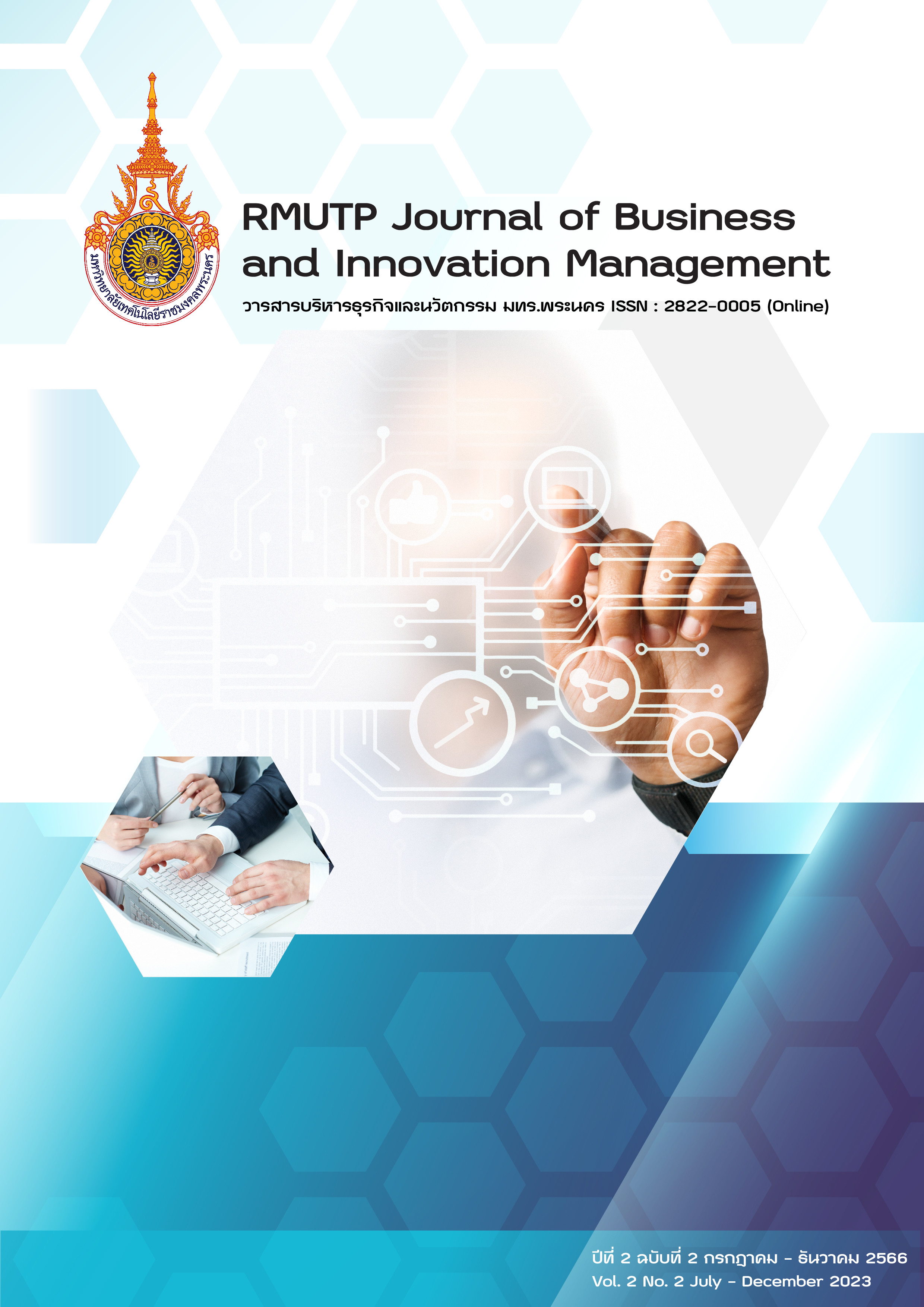อิทธิพลของทัศนคติ ความรู้ และการรับรู้ของคนเจนเนอร์เรชั่นแซดต่อ การตัดสินใจใช้สกุลเงินดิจิทัล : กรณีศึกษาจังหวัดปทุมธานี
Main Article Content
บทคัดย่อ
การวิจัยครั้งนี้มีจุดประสงค์ (1) เพื่อศึกษาปัจจัยด้านประชากรศาสตร์ที่มีผลต่อการตัดสินใจใช้สกุลเงินดิจิทัลของคนเจเนอร์เรชั่นแซด (2) เพื่อศึกษาความรู้ความเข้าใจเกี่ยวกับสกุลเงินดิจิทัลของคนเจเนอร์เรชั่นแซดที่มีอิทธิพลต่อการตัดสินใจใช้สกุลเงินดิจิทัล (3) เพื่อศึกษาทัศนคติของคนเจเนอร์เรชั่นแซดที่มีอิทธิพลต่อการตัดสินใจใช้สกุลเงินดิจิทัล (4) เพื่อศึกษาปัจจัยการรับรู้เกี่ยวกับสกุลเงินดิจิทัลของคนเจเนอร์เรชั่นแซดที่มีอิทธิพลต่อการตัดสินใจใช้สกุลเงินดิจิทัล กลุ่มตัวอย่างที่ใช้ในการศึกษา คือ กลุ่มคนเจเนอร์เรชั่นแซดในจังหวัดปทุมธานี เครื่องมือที่ใช้ คือ แบบสอบถามความคิดเห็นแบบมาตรวัดประเมินค่า 5 ระดับ โดยมีสถิติที่ใช้ในการทดสอบสมมติฐาน ได้แก่ การเปรียบเทียบแบบรวมกลุ่ม ความแปรปรวนทางเดียว การวิเคราะห์สัมประสิทธิ์สหสัมพันธ์ และสถิติการวิเคราะห์ถดถอยเชิงพหุคูณ ผลการวิจัยพบว่า การตัดสินใจใช้สกุลเงินดิจิทัลของคน เจเนอร์เรชั่นแซด ในจังหวัดปทุมธานีที่มี อายุ ระดับการศึกษา และรายได้เฉลี่ยต่อเดือน มีการตัดสินใจใช้สกุลเงินดิจิทัลที่แตกต่างกัน ส่วนด้านความรู้ความเข้าใจ ทัศนคติ และปัจจัยการรับรู้ประโยชน์เกี่ยวกับสกุลเงินดิจิทัลมีอิทธิพลต่อการตัดสินใจใช้สกุลเงินดิจิทัลอย่างมีนัยสำคัญ อย่างไรก็ตามปัจจัยการรับรู้ความเสี่ยงเกี่ยวกับสกุลเงินดิจิทัลไม่มีอิทธิพลต่อการตัดสินใจใช้สกุลเงินดิจิทัล
Article Details

อนุญาตภายใต้เงื่อนไข Creative Commons Attribution-NonCommercial-NoDerivatives 4.0 International License.
เนื้อหาและข้อมูลในบทความที่ลงตีพิมพ์ในวารสารบริหารธุรกิจและนวัตกรรม มหาวิทยาลัยเทคโนโลยีราชมงคลพระนคร ถือเป็นความรับผิดชอบของผู้แต่งบทความแต่เพียงผู้เดียว โดยกองบรรณาธิการวารสารจะไม่มีส่วนรับผิดชอบในความเสียหายที่เกิดขึ้นในทุกกรณี
เอกสารอ้างอิง
กษิดิศ สังสีเพชร. (2564). การตัดสินใจลงทุนในสกุลเงินดิจิทัล ของนักลงทุนในเขตกรุงเทพมหานคร. (บทความวิจัย, สาขาการเงินและการธนาคาร, คณะบริหารธุรกิจ, มหาวิทยาลัยรามคำแหง).
กิตสุรณ สังขสุวรรณ์. (2565). การชำระหนี้ด้วยคริปโทเคอร์เรนซี่ตามประมวลกฎหมายแพ่งและพาณิชย์. นิตยสารบทบัณฑิตย์, 78(3), 35-77.
ธนกิจ บุญลือ และเฉลิมพร เย็นเยือก. (2561). ปัจจัยที่ส่งผลต่อความพึงพอใจในการออมเงินของประชาชนใน จังหวัดปทุมธานี. In Rangsit Graduate Research Conference: RGRC (Vol. 13, pp. 528-539).
ธานินทร์ ศิลป์ จารุ. (2555). การวิจัยและวิเคราะห์ข้อมูลทางสถิติด้วย SPSS. พิมพ์ครั้งที่ 11. กรุงเทพมหานคร: บิสซิเนสอาร์แอนด์ดี.
นุชจรี จินดาวรรณ. (2559). การทดสอบปัจจัยที่มีอิทธิพลต่อการตั้งใจใช้บริการอินเตอร์เน็ตแบงค์กิ้ง กรณีศึกษา ลูกค้าธนาคารกรุงไทย จำกัด (มหาชน) ในจังหวัดพัทลุง. (วิทยานิพนธ์, มหาวิทยาลัยสงขลานครินทร์).
ประภาเพ็ญ สุวรรณ. (2520). ทัศนคติ: การวัดการเปลี่ยนแปลงและพฤติกรรมอนามัย. กรุงเทพมหานคร: ไทยวัฒนาพานิช จำกัด.
ปรารถนาอารี มูฮัมหมัดอัลโคลเลซ. (2563). การยอมรับเทคโนโลยีพฤติกรรมผู้บริโภคออนไลน์และการรับรู้ความเสี่ยงที่มีความสัมพันธ์ต่อการตัดสินใจใช้สกุลเงินดิจิทัลของผู้บริโภคในเขตพื้นที่กรุงเทพมหานคร. (สารนิพนธ์, หลักสูตรบริหารธุรกิจมหาบัณฑิต, สาขาวิชาการจัดการ, คณะบริหารธุรกิจเพื่อสังคม, มหาวิทยาลัยศรีนครินทรวิโรฒ).
ปัญจพงศ์ ลอยไสว. (2563). ปัจจัยที่มีผลต่อการลงทุนบิตคอยน์ในประเทศไทย. (การค้นคว้าอิสระปริญญามหาบัณฑิต, สถาบันบัณฑิตพัฒนบริหารศาสตร์).
พงษ์ศักดิ์ ซิมมอนด์ส. (2560). การทดสอบข้อตกลงเบื้องต้นของการวิเคราะห์การถดถอยเชิงเส้นตรง. Journal of Research and Curriculum Development, 20-37.
พรชัย ชุนหจินดา. (2561). บทเรียนจากทศวรรษแรกของคริปโทเคอรเรนซี. e-jodil, 8(1), 1-28.
มินตรา เชื้ออ่ำ. (2561). การรับรู้และทัศนคติของประชาชนที่มีต่อการใช้สกุลเงินดิจิทัลบิทคอยน์ (Bitcoin) ในประเทศไทย. วารสารบริหารธุรกิจและสังคมศาสตร์, 1(3), 83-97.
ลักขณา หนูมี. (2557). ความรู้และความเข้าใจของนักบัญชีธุรกิจพัฒนาอสังหาริมทรัพย์ในอำเภอเชียงใหม่ ต่อมาตรฐานการบัญชีฉบับที่ 18 (ปรับปรุง 2552) เรื่องรายได้. (การค้นคว้าอิสระปริญญามหาบัณฑิต, มหาวิทยาลัยเชียงใหม่).
วุฒิชัย จำนงค์. (2523). พฤติกรรมการตัดสินใจ. กรุงเทพมหานคร: โอเดียนสโตร์.
ศิริวรรณ เสรีรัตน์. (2538). พฤติกรรมผู้บริโภค. กรุงเทพมหานคร: สำนักพิมพ์พัฒนาศึกษา.
สรัษฎ์ ดาราวงษ์. (2544). ความรู้ความเข้าใจและการปฏิบัติตามกฎหมายจราจรของประชาชนในเขตกรุงเทพมหานคร. (วิทยานิพนธ์ปริญญามหาบัณฑิต, มหาวิทยาลัยเกษตรศาสตร์).
สำนักงานสถิติจังหวัดปทุมธานี (2564). รายงานสถิติจังหวัดปทุมธานี พ.ศ. 2564. สืบค้นเมื่อ 2 ธันวาคม 2566, จาก https://pathumthani.nso.go.th/images/ebook/plan/presen2564.pdf
สิริสุดา รอดทอง. (2556). ความตั้งใจในการดาวน์โหลดโมบายแอพพลิเคชั่นของผู้ใช้โทรศัพท์เคลื่อนที่ในกลุ่มสมาร์ทโฟน. (วิทยานิพนธ์, มหาวิทยาลัยเทคโนโลยีราชมงคลธัญบุรี).
สุวสา ชัยสุรัตน์. (2537). หลักการตลาด. กรุงเทพมหานคร: ภูมิบัณฑิตการพิมพ์.
สุวิมล ติรกานันท์. (2557). ระเบียบวิธีการวิจัยทางสังคมศาสตร์: แนวทางสู่การปฏิบัติ. (พิมพ์ครั้งที่ 12). กรุงเทพมหานคร: โรงพิมพ์แห่งจุฬาลงกรณ์มหาวิทยาลัย.
อธิญชัย วีรดุษฎีนนท์. (2561). ‘สกุลเงินดิจิทัล’ มูลค่าแท้จริงอยู่ที่ความเชื่อมั่น. สืบค้นเมื่อ 18 พฤศจิกายน2566, จาก https://themomentum.co/cryptocurrency-bitcoin-feature/
อลิตา คุ้มเขต. (2562). ทัศนคติต่อสกุลเงินดิจิทัล (Cryptocurrency) ของประชากรวัยทำงานที่สนใจการลงทุนในเขตกรุงเทพมหานคร. (วิทยานิพนธ์ปริญญามหาบัณฑิต, มหาวิทยาลัยรามคำแหง).
อลิสา ธีระศักดาพงษ์. (2559). ปัจจัยที่ส่งผลต่อการเลือกใช้งาน Bitcoin. (การค้นคว้าอิสระปริญญามหาบัณฑิต, มหาวิทยาลัยธรรมศาสตร์).
Barnard, C. I. (1938). The Functions of the Executive. Cambridge: Harvard Univer.
Bauer, R. A. (1960). Consumer Behavior as Risk Taking. In Proceedings of the 43rd National Conference of the American Marketing Association, June 15, 16, 17, Chicago, Illinois, 1960. American Marketing Association.
Cronbach, Lee J. (1990). Essentials of Psychological Testing (5th ed.). New York: Harper Collins.
Cross-Bystrom, A. (2010). What you need to know about generation Z interactive. Access June 20, 2022. Available from: http://www.imediaconnection.com/content/27425.asp
Cunningham, M. S. (1967). The Major Dimensions of Perceived Risk. Risk taking and information handling in consumer behavior, 82-108.
Hatthasak, M. (2006). Creating Knowledge and Understanding of Learning and Teaching: Learning and Understanding Generation Y. Access June 20, 2022. Available from: http://regis.rmutp.ac.th/km_regis/stock/2557/2-57.ppt
Herzberg, F. (1959). The Motivation to Work. New York: John Wiley and Sons.
Likert, R. (1967). New Patterns of Management. New York: McGraw-Hill.
Maslow, A. H. (1970). Motivation and Personality (2nd ed.). New York: Harper and Row.
Richard, M. O., & Chebat, J. C. (2016). Modeling online consumer behavior: Preeminence of emotions and moderating influences of need for cognition and optimal stimulation level. Journal of Business Research, 69(2), 541-553.
Schroer, W. J. (2008). Generations X, Y, Z and the Others. The Portal, 40, 9.Access June 20, 2022. Available from: https://s3.amazonaws.com/rdcmsiam/files/production/public/newimages/
portalpdfs/2008_03_04.pdf
Simon, H.A. (1966). Administrative Behavior: A Study of Decision-Making Processes in Administrative Organization. New York: The Free Press.
Xu, H., Teo, H. H., & Tan, B. (2005). Predicting the Adoption of Location-Based Services: The Role of Trust and Perceived Privacy Risk. ICIS 2005 Proceedings. Paper 71.


